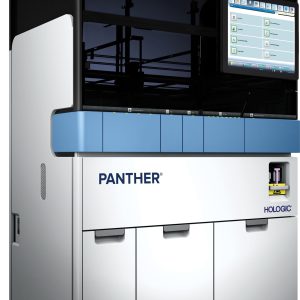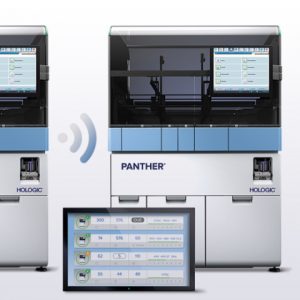Description
The VERIGENE® Bloodstream Infection portfolio empowers laboratories to rapidly identify causative pathogens, as well as their associated resistance markers.
Clinical studies have demonstrated that the VERIGENE Bloodstream Infection assays lower overall hospital costs, shorten the patient’s length of stay, and most importantly, improve patient outcomes by enabling a more targeted treatment plan—faster.1 These assays have been proven to synergize with antimicrobial stewardship programs, reduce the use of unnecessary antibiotics, and effectively manage infection control.1,2
The VERIGENE® Gram-Positive Blood Culture Nucleic Acid Test (BC-GP) performed using the sample-to-result VERIGENE System is a qualitative, multiplexed in vitro diagnostic test for the simultaneous detection and identification of potentially pathogenic gram-positive bacteria which may cause bloodstream infection (BSI). BC-GP is performed directly on blood culture bottles identified as positive by a continuous monitoring blood culture system and which contain gram-positive bacteria.
BC-GP detects and identifies the following bacterial genera and species: Staphylococcus spp., Staphylococcus aureus, Staphylococcus epidermidis, Staphylococcus lugdunensis, Streptococcus spp., Streptococcus pneumoniae, Streptococcus pyogenes, Streptococcus agalactiae, Streptococcus anginosus group, Enterococcus faecalis, Enterococcus faecium, and Listeria spp.
In addition, BC-GP detects the mecA resistance marker, inferring mecA-mediated methicillin resistance, and the vanA and vanB resistance markers, inferring vanA/vanB-mediated vancomycin resistance. In mixed growth, BC-GP does not specifically attribute van-mediated vancomycin resistance to either E. faecalis or E. faecium, or mecA-mediated methicillin resistance to either S. aureusor or S. epidermidis.
BC-GP is indicated for use in conjunction with other clinical and laboratory findings to aid in the diagnosis of bacterial bloodstream infections; however, is not to be used to monitor these infections. Sub-culturing of positive blood cultures is necessary to recover organisms for susceptibility testing, identification of organisms not detected by BC-GP, differentiation of mixed growth, association of antimicrobial resistance marker genes to a specific organism, or for epidemiological typing.
The VERIGENE® Gram-Negative Blood Culture Nucleic Acid Test (BC-GN) performed using the sample-to-result VERIGENE® System is a qualitative multiplexed in vitro diagnostic test for the simultaneous detection and identification of selected gram-negative bacteria and resistance markers. BC-GN is performed directly on blood culture media using blood culture bottles identified as positive by a continuous monitoring blood culture system and which contain gram-negative bacteria as determined by Gram stain.
BC-GN detects and identifies the following Bacterial Genera and Species: Acinetobacter spp., Citrobacter spp., Enterobacter spp., Proteus spp., Escherichia coli1, Klebsiella pneumoniae, Klebsiella oxytoca, and Pseudomonas aeruginosa, and Resistance Markers: CTX-M (blaCTX-M), KPC (blaKPC), NDM (blaNDM), VIM (blaVIM), IMP (blaIMP), and OXA (blaOXA).
BC-GN is indicated for use in conjunction with other clinical and laboratory findings to aid in the diagnosis of bacterial bloodstream infections; however, is not used to monitor these infections. Sub-culturing of positive blood cultures is necessary to recover organisms for antimicrobial susceptibility testing (AST), for identification of organisms not detected by BC-GN, to detect mixed infections that may not be detected by BC-GN, for association of antimicrobial resistance marker genes to a specific organism, or for epidemiological typing.
Gram-Positive Blood Culture Test (BC-GP)
Species:
Staphylococcus aureus
Staphylococcus epidermidis
Staphylococcus lugdunensis
Streptococcus agalactiae
Streptococcus pneumoniae
Streptococcus pyogenes
Enterococcus faecalis
Enterococcus faecium
Group
Streptococcus anginosus
Genus
Staphylococcus spp.
Streptococcus spp.
Listeria spp.
Resistance
mecA (methicillin)
vanA (vancomycin)
vanB (vancomycin)
Gram-Negative Blood Culture Test (BC-GN)
Species
Escherichia coli
Klebsiella pneumoniae
Klebsiella oxytoca
Pseudomonas aeruginosa
Genus
Acinetobacter spp.
Citrobacter spp.
Enterobacter spp.
Proteus spp.
Resistance
CTX-M (ESBL)
IMP (carbapenemase)
KPC (carbapenemase)
NDM (carbapenemase)
OXA (carbapenemase)
VIM (carbapenemase)
The VERIGENE Bloodstream Infection assays enable healthcare professionals to optimize therapy earlier, which has been shown to reduce the length of inpatient care, lowering overall healthcare costs.





